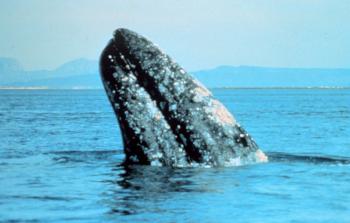 A major oil and gas consortium has agreed to suspend planned seismic testing off Sakhalin Island in the Russian Far East, a crucial feeding area for the critically endangered Western Gray whale.
A major oil and gas consortium has agreed to suspend planned seismic testing off Sakhalin Island in the Russian Far East, a crucial feeding area for the critically endangered Western Gray whale.
The Western Gray is one of the world’s most endangered whales, with only 25 known breeding females remaining.
During an April 24 meeting of international whaling experts and Russian government officials, Sakhalin Energy – a partnership between Shell, Gasprom and others – agreed to cancel its proposed 2009 seismic activities, despite having already put plans in place for the work.
New science presented during this meeting revealed a significant decline in sightings and behaviour changes of the whales in their primary feeding area near Piltun Bay. Oil and gas exploration activities in the area appear to have displaced the whales to deeper areas offshore, making it more difficult for whale calves to feed.
Since the Western Gray Whale only feeds in the summertime, such displacement could be devastating.
Sakhalin Energy sets an example for other companies, like BP, Exxon, Rosneft, which have ignored repeated calls to cooperate with the panel, ignored advice on how to mitigate the impact of their activities, and refused to provide even basic information on what their activities are in the region.
“WWF lauds the responsible and forward looking approach taken by Sakhalin Energy in heeding the urgent call from the panel,” said Aleksey Knizhnikov from WWF-Russia. “The results seen today demonstrate that collaborative science based initiatives like this panel process can succeed – even on issues as complex as oil and gas development”.
“Today’s decision is a victory for the Western Gray Whales,” said Doug Norlen, from Pacific Environment, an international NGO that has monitored Sakhalin oil and gas projects for over a decade.



















